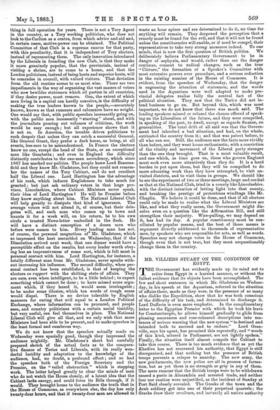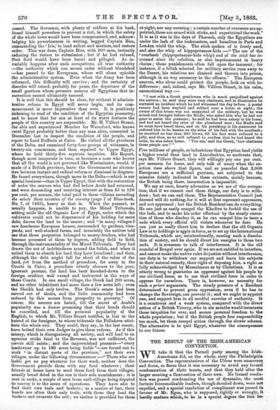MR. VILLIERS STUART ON THE CONDITION OF EGYPT.
THE Government has evidently made up its mind not to retire from Egypt in a hurried manner, or without the fullest evidence that its objects have been accomplished. The few and short sentences in which Mr. Gladstone on Wednes- day, in his speech at the Aquarium, referred to the situation of affairs there, made as they were, in the presence of so many who dislike the Expedition, show that he was both conscious of the difficulty of his task, and determined to discharge it. Lord Dufferin is even more emphatic. In the complimentary letter to the Egyptian Premier with which he took his leave for Constantinople, he allows himself gradually to glide from pleasing assurances and rose-coloured descriptions into sen- tences of serious warning that the new system " is destined and intended both to succeed and to endure." Lord Gran- ville, says his agent, has promised this repeatedly, and "words of this kind, uttered in Parliament, are not lightly spoken." Finally, the situation itself almost compels the Cabinet to take this course. There is too much evidence that as yet the Khedive has not recovered his authority, that Egypt is still disorganised, and that nothing but the presence of British troops prevents a relapse to anarchy. The new army, the new gendarmerie, the new police are all in process of forma- tion, but as yet there is no strength or grip in any of them. The mere rumour that the British troops were to be withdrawn caused a panic in Alexandria and arrested trade, and neither fear nor caution were unjustified, as the incident of Sunday at Port Said clearly revealed. The Greeks of the town and the Arab soldiery got into one of their perpetual quarrels ; the Greeks drew their revolvers, and instantly all native authority
ceased. The Governor, with plenty of soldiers at his back, found himself powerless to prevent a riot, in which the safety of the whole town would have been compromised, and, acknow- ledging his powerlessness in writing, begged Captain Rice, commanding the 'Iris,' to land sailors and marines, and restore order. This was done, Captain Rice, with 200 men, instantly reducing the rioters to submission ; but if he had refused, Port Said would have been burnt and pillaged. As in- variably happens after such occupations, all true authority —the authority which can secure order without bloodshed —has passed to the Europeans, whose will alone upholds the administrative system. Even when the Army has been reformed, this difficulty will survive ; and the certainty of disorder will retard, probably for years, the departure of the small garrison whose presence assures all Egyptians that in- surrection cannot ultimately succeed.
It is well that this should be clear, for without it adminis- trative reform in Egypt will never begin, and its com- mencement is more imperative than ever. It is positively sickening to read of the condition of the Egyptian peasantry, and to know that for one at least of its worst features the people of this country are responsible. Mr. H. Villiers Stuart, the able and experienced Member for Waterford, who knows rural Egypt probably better than any man alive, consented in December last to inspect the condition of the people, and report to Lord Dufferin at Cairo. He visited all the provinces of the Delta, and examined forty-four groups of witnesses, in twenty-six communes, and then repaired to Upper Egypt, where he held thirty-five separate inquiries. His Report, though most temperate in tone, as becomes a man who knows that all the world is not governed like Westminster, would, if made of a British province, leave the Government no alterna- tive between instant and radical reform or dismissal in disgrace. He found everywhere, though more in the Delta—which is our special business—than in Upper Egypt, that with the restoration of order the usurers who had fled before Arabi had returned, and were demanding and receiving interest at from 65 to 120 per cent, per annum, the total paid to these villains exceeding the whole State taxation of the country (page 7 of Blue-book, No. 7, of 1883), heavy as that is. When the peasant, as usually happens, is unable to pay, the Mixed Tribunals, setting aside the old Organic Law of Egypt, under which the cultivator could not be dispossessed of his holding for mere debt, decree the land to the usurer ; and "in many villages I saw handsome European houses, surrounded by gardens, vine- yards, and well-stocked farms, and invariably the natives told me that these properties belonged to money-lenders, who had become possessed of them by degrees, adding field to field, through the instrumentality of the Mixed Tribunals. They had drawn the net of indebtedness around the fellah, and when it suited them to absorb his land they have foreclosed ; and then, although the debt might fall far short of the value of the land, yet from the method of procedure, far away in the Courts in Cairo, a procedure utterly obscure to the poor, ignorant peasant, the land has been knocked-down to the foreign creditor, well versed and instructed in the ways of these Courts. In one small village, the Greek had 200 acres, and no other inhabitant had more than a few acres left ; even the Sheikh had only twelve. The Greek's estate had been carved out of theirs, and the little community had been reduced by this means from prosperity to proverty." Of course, the usurers are hated, till the secret of Arabi's popularity was a decree promising that their bonds should be cancelled, and till the personal popularity of the English, to which Mr. Villiers Stuart testifies, is lost in the hatred of the foreigner, to whose tribunals the Fellaheen attri- bute the whole evil. They could, they say, in the last resort, have bribed their own Judges to give them redress. As if this misery, which is disorganising all society, and will lead to an agrarian strike fatal to the Revenue, was not sufficient, the corvee still exists ; and the impoverished peasants—" every landowner up to 100 acres being liable "—are forced out to work "in distant parts of the province," not their own villages, under the following circumstances :—" Those who are liable get no pay whatever for their work, neither does the Government provide them with any food whatever ; their friends at home have to send them food from their villages, usually bread dried in the sun is their sole nourishment ; it is sent in sacks, a couple of men from each village being deputed to convey it to the scene of operations. They have also to find their own tools and baskets ; as a matter of fact, their hands are often their only tools, with these they load the baskets and excavate the soil ; no shelter is provided for them at night, nor any covering ; a certain number of overseers are ap- pointed, these are armed with sticks, and superintend the work." It is as it was in the days of Pharaoh, only the Egyptians are under the lash of the taskmasters, and Israelites in Paris and London wield the whip. The stick spoken of is freely used, and also the whip of hippopotamus-hide :—" The use of the courbash ' (hippopotamus-hide whip) and of the stick, has in- creased since the rebellion, as also imprisonment in heavy chains ; these punishments often fall upon the innocent ; for instance, if a fellah selected for military service runs away to the Desert, his relatives are chained and thrown into prison, although in no way accessory to the offence." The European usurers, who alone could protect the people, look on with in
; and, indeed, says Mr. Villiers Stuart, in his calm, unemotional way :—
" I met with a Greek gentleman who is much prejudiced against the natives ; he said they were very obstinate, and in illustration he narrated an incident which he had witnessed the day before. A postal runner had been waylaid and robbed near a house at night, the owner of this house was not suspected of the robbery, but he was seized and brought before the Madir, who asked him why he had not gone to assist the postman ; he said he had been asleep in his home, and had not heard the cries of the plundered man ; the Mudir said be must have heard them, and on his persisting in his statement he ordered him to be beaten on the soles of his feet with the courbash; he received no less than 800 blows, till his feet were reduced to a jelly, and then, as he still refused to confess that he had heard the noise, he was taken home. 'You see,' said the Greek, 'how obstinate these people are !'"
Five millions of people, so industrious that Egyptian land yields a higher rental than land in Lincolnshire, so moderate that, says Mr. Villiers Stuart, they will willingly pay one per cent. per mensem for loans, and only talk of usury when the ex- action rises above that figure, and so peaceful that 2,000 Europeans are a sufficient garrison, are subjected to the miseries faintly indicated in these extracts, mainly because, the British being there, insurrection is impossible.
We say at once, hearty advocates as we are of the occupa- tion, that if we cannot end these things, our duty is to with- draw ; but we can end them. The Representative Council just decreed will do nothing, for it will at first represent oppressors, and not oppressed ; but the British Resident can do everything. He can just as easily compel the Khedive to forbid the use of the lash, and to make his order effectual by the steady execu- tion of those who disobey it, as he can compel him to issue a code which every official will violate whenever he dare. He can just as easily direct him to declare that the old Organic Law as to holdings is again in force, as to set up the International Tribunals, which are, unintentionally, causing such a dissolu- tion of society, and he should direct his energies to those two ends. It is nonsense to talk of interference. It is the old scandal of Bengal over again. If we are not entitled to interfere, and cannot make the native ruler do justice without interference, our duty is to withdraw our support and leave his subjects to their natural remedy, their right of deposing him, a right as fully acknowledged by Mussulmans as by Christians. It is as utterly wrong to guarantee an oppressor against his people by our civilised force, as to use that civilised force in order to oppress for ourselves. There is, however, no necessity for such a priori arguments. The steady pressure of a Resident determined to prevent gross oppression, even if he has to change the Sovereign, can prevent it ; and we ought to appoint one, and support him in all needful exercise of authority. It is a cumbrous and a weak system, compared with the direct action of a British Viceroy, who in six months would terminate these iniquities for ever, and secure personal freedom to the whole population ; but if the British people fear responsibility too much, let them compel action through the slower scheme. The alternative is to quit Egypt, whatever the consequences to our future.



































 Previous page
Previous page